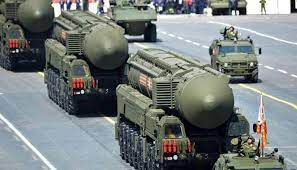President Vladimir Putin ordered Russian nuclear deterrent forces to be placed on high alert Sunday in response to what he called “aggressive statements” by senior NATO states, escalating East-West tensions over Russia’s invasion of Ukraine.
The directive indicates Putin has ordered Russia’s nuclear weapons to be primed for a higher level of readiness to launch, boosting the risk of a nuclear conflict. The Russian leader also mentioned the harsh financial sanctions imposed by the West against Russia, including Putin himself, in his speech.
Putin authorized the Russian defense minister and the commander of the military’s General Staff to place the nuclear deterrent forces in a “special regime of combat duty” at a meeting with his top officials.
“Not only are Western countries adopting unfriendly economic actions against our country, but top officials from prominent NATO members have made aggressive statements about our country,” Putin said in a televised broadcast.
The alarming move came as street fighting erupted in Ukraine’s second-largest city and Russian troops pressed their way into strategic ports in the country’s south, advances that appeared to signal a new phase of Russia’s invasion after a wave of attacks on airfields and fuel facilities elsewhere in the country.
After large explosions lit up the morning sky and police reported explosives at one of the airports, the city, Kyiv, was eerily quiet. A rigorous 39-hour curfew kept people off the streets, so only an occasional car appeared on a lonely main avenue. Instead, locals hunkered down in their houses, underground garages, and subway stations, fearful of a full-scale Russian attack.
“The previous night was difficult – more shelling, more bombing of civilian infrastructure and residential areas,” Ukrainian President Volodymyr Zelensky said. “The occupiers would consider every facility in the country suitable targets.”
According to the Kremlin, Russia sent a delegation to Belarus for peace talks with Ukraine following its successes to the east in the city of Kharkiv and other ports. Other venues were suggested by Zelensky, who stated that his country was unwilling to convene in Belarus because it had been used as a staging area for the invasion.
Russia’s troops had waited on the outskirts of Kharkiv, a city of 1.4 million people approximately 20 kilometers (12.4 miles) south of the Russian border, until Sunday, when other forces marched by to press the offensive deeper into Ukraine.
Russian vehicles were seen moving across Kharkiv in videos released to Ukrainian media and social media, and Russian servicemen were seen roaming the city in small groups. One showed Ukrainian troops firing at Russian light utility vehicles that had been abandoned nearby.
The photographs highlighted the tenacious resistance Russian troops confront as they attempt to invade Ukraine’s major cities. Ukrainians have flocked to the capital, Kyiv, and other cities to help protect them, seizing guns from officials and manufacturing firebombs to confront Russian forces.
According to Andriy Sinyuk, a prosecutor’s office official, Ukraine’s government is also releasing detainees with military expertise who wish to fight for the country. He didn’t say whether the measure applied to all prisoners convicted of crimes of any level.
Russian President Vladimir Putin has not revealed his long-term goals, but Western diplomats fear he is determined to destabilize Ukraine’s government and replace it with his own, redrawing Europe’s map and resurrecting Moscow’s Cold War-era power.
The pressure on strategic ports in Ukraine’s south appeared to be intended at capturing control of the country’s coastline, which stretches from the country’s western border with Romania to its eastern border with Russia. Russian soldiers have blocked the cities of Kherson on the Black Sea and the port of Berdyansk on the Azov Sea, according to a spokesman for the Russian Defense Ministry, Maj. Gen. Igor Konashenkov.
He further claimed that Russian soldiers had taken control of an airbase near Kherson and the city of Henichesk on the Azov Sea. Fighting has also been reported near Odesa, Mykolaiv, and other cities in Ukraine.
Taking away Ukraine’s access to its seaports would be devastating to the country’s economy. It might also allow Moscow to establish a land corridor to Crimea, which it annexed in 2014 and had only been connected to Russia until recently by a 19-kilometer (12-mile) bridge, Europe’s longest, which opened in 2018.
According to the mayor of Vasylkiv, flames billowed from an oil store near an airport in Vasylkiv, a city 37 kilometers (23 miles) south of Kyiv where there has been severe fighting. According to the president’s office, Russian soldiers blew up a gas pipeline in Kharkiv, forcing the administration to advise residents to cover their windows with moist cloth or gauze to protect them from the smoke.
In a letter addressed to Russian forces, Ukrainian military deputy commander Lt.-Gen. Yevhen Moisiuk struck a confrontational tone.
“Drop your guns and raise your hands to show our military and citizens that you have heard us.” In a Facebook video, Moisiuk stated, “This is your ticket home.”
The number of people killed or injured so far in Europe’s largest land warfare since World War II is unknown due to the fog of war.
On Saturday, Ukraine’s health minister announced that 198 people had been murdered, including three children, and over 1,000 more had been injured. It was unclear whether the estimates accounted for both military and civilian deaths. Russia has not provided any information about casualties.
Sergiy Kyslytsya, Ukraine’s United Nations ambassador tweeted on Saturday that Ukraine has appealed to the International Committee of the Red Cross to “enable the return of thousands of Russian soldiers’ dead.” According to a chart attached to the article, 3,500 Russian servicemen were killed.
The situation in Ukraine is “a limitation for our teams on the ground,” according to Laetitia Courtois, the ICRC’s permanent observer to the United Nations. “We therefore cannot confirm numbers or other specifics,” she said.
Since the invasion began on Thursday, nearly 368,000 Ukrainians have arrived in neighboring countries, according to the UN refugee agency. Depending on how long the fighting continues the United Nations estimates that up to 4 million people will be displaced.
Russia’s onslaught, according to Zelensky, is “state terrorism.” He claimed that the attacks on Ukrainian cities should be examined by an international war crimes tribunal and that Russia’s position as one of the UN Security Council’s five permanent members should be jeopardized.
“Russia has chosen the path of evil, and the world should consider stripping it of its place on the United Nations Security Council,” he said.
Dmitry Peskov, a Kremlin spokesman, said a Russian group of military officers and diplomats landed in Gomel, Belarus, on Sunday for talks with Ukraine. On Friday, Zelensky proposed to discuss a major Russian demand: the abandonment of NATO aspirations.
Ukraine’s president stated that his country was prepared for peace negotiations, but that this was not the case in Belarus.
“We offered Warsaw, Bratislava, Budapest, Istanbul, Baku, and any other city in a country that hasn’t been utilized for missile launches to the Russian side,” Zelensky added. “Only then could the negotiations be honest and the war put to an end.”
Ukraine, according to Peskov, had proposed having discussions in Gomel. He also stated that the Russian military action would continue until the discussions began.
Mykhailo Podolyak, a Zelensky aide, slammed Moscow’s offer as “manipulation,” saying that Ukraine had not agreed to talks in Belarus.
As Russia presses forward with its onslaught, the West is seeking to arm the outmanned Ukrainian military with guns and ammunition while punishing Russia with broad sanctions aimed at isolating Moscow even more.
The United States has promised Ukraine an additional $350 million in military aid, including anti-tank weapons, body armor, and small guns. Germany claimed it would provide missiles and anti-tank weapons to the besieged country and would block Russian jets from flying through its airspace.
As part of a new round of sanctions aimed at imposing a severe cost on Moscow for the invasion, the United States, the European Union, and the United Kingdom agreed to block “selected” Russian banks from the SWIFT global financial messaging system, which moves money between more than 11,000 banks and other financial institutions worldwide. They also agreed that Russia’s central bank would face “restrictive measures.”
Elon Musk, the tech tycoon, responded on Twitter to a request from Ukraine’s minister of digital transformation, saying that his satellite-based internet system Starlink was now operational in Ukraine and that “additional terminals are on the way.”
Meanwhile, German Chancellor Olaf Scholz announced on Sunday that his country will contribute 100 billion euros ($112.7 billion) to a special fund for its armed forces, bringing defense spending above 2% of GDP for the first time. Scholz said the spending was needed “to defend our freedom and democracy” before a special session of the Bundestag.
Putin ordered soldiers into Ukraine after weeks of denials, while amassing a force of around 200,000 troops along the countries’ borders. He says that the West has failed to take Russia’s security worries about NATO, the Western military alliance that Ukraine hopes to join, seriously enough. He has, however, expressed contempt for Ukraine’s right to exist as a sovereign state.
Russia maintains that its attack on Ukraine is only focused on military objectives, but it has also hit bridges, schools, and civilian areas.
Oksana Markarova, Ukraine’s ambassador to the United States said the country was compiling evidence of bombardment of residential areas, kindergartens, and hospitals to present to an international war crimes court in The Hague as possible crimes against humanity. The prosecutor of the International Criminal Court has stated that he is keeping a careful eye on the situation.
Putin might use “the most unpleasant measures,” including illegal chemical or biological weapons, to destroy Ukraine, British Foreign Secretary Liz Truss said on Sunday.
“I urge Russia not to escalate this conflict,” Truss told Sky News, “but we must be prepared for Russia to seek to use even harsher weapons.”

















